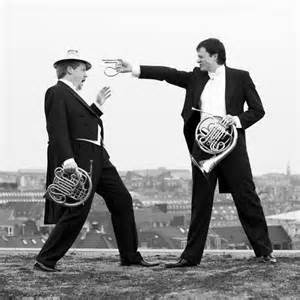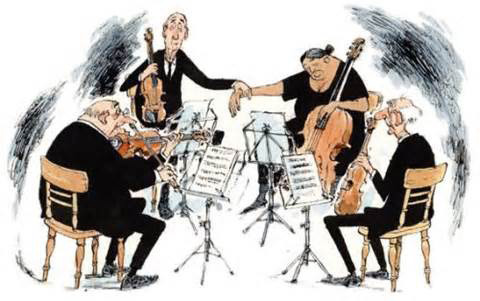 There once was a young man in our cello section, a very talented musician but a little green, who would practice all of my orchestral solos on stage, loudly, for all to hear. I tried not to get rattled—(did it sound better than me? I’d ask myself…) and difficult not to categorize it as mutiny. It’s a no-no! As is playing all the hardest licks from your upcoming Saint-Saëns concerto onstage or backstage. Don’t get me wrong, warming up is essential and admired but playing your solos might be taken as showing off—solos more important than your orchestra music? One might ask.
There once was a young man in our cello section, a very talented musician but a little green, who would practice all of my orchestral solos on stage, loudly, for all to hear. I tried not to get rattled—(did it sound better than me? I’d ask myself…) and difficult not to categorize it as mutiny. It’s a no-no! As is playing all the hardest licks from your upcoming Saint-Saëns concerto onstage or backstage. Don’t get me wrong, warming up is essential and admired but playing your solos might be taken as showing off—solos more important than your orchestra music? One might ask.
Elgar Enigma cello solo movement
Another time, the newest newbie sat with me, second chair, when I was sitting principal cello. We were performing Elgar’s Enigma Variations, which has several lovely solos for one cello—the lead player. The newbie repeatedly begged, “Please call in sick for one concert. Please be sick for one, just one performance!” In other words let me play the solos.
If you are to be successful in an orchestral setting, you need to have manners— unwritten rules of behavior that will help you become successful in the orchestra family. It’s tough enough that you have to take direction all the time from the conductor and also your section leader. Annoying behavior from colleagues makes the whole workplace toxic.
So here are a few tips:
1. Be prepared. Know your music before the first rehearsal. Sight-reading is a not appreciated by others who have spent hours learning the music.
2. If you’ve borrowed the music be considerate to your stand partner and arrive at the rehearsal early with the music. They might like to glance at a few tough licks.
3. Be in your seat well before the time for tuning. There is nothing worse than having a colleague racing in at the last minute who then jostles the music stand and shuffles chairs to make enough room for him or herself when the conductor is already coming onstage.
 4. Agree with your stand partner where you can put a few markings or fingerings, in pencil. Typically in the string section, the person sitting on the outside of the stand will write above the staff and the person sitting on the inside of the stand will write below the staff but keep these to a minimum. The music has to be legible and erasable for performances down the road.
4. Agree with your stand partner where you can put a few markings or fingerings, in pencil. Typically in the string section, the person sitting on the outside of the stand will write above the staff and the person sitting on the inside of the stand will write below the staff but keep these to a minimum. The music has to be legible and erasable for performances down the road.
5. Do not talk during the rehearsal unless it’s a direct question to your section leader. Every orchestra has a jokester who chatters a running commentary during the rehearsal. Although it can be funny it is distracting to the other members of the orchestra.
6. Keep a poker face. Not only is it a good idea for self-preservation should the conductor say something that you disagree with, but there is no excuse for making any kind of facial expression in reaction to an error of a colleague—in rehearsal and especially during a concert. You could be the one who falls into a rest in the music or misses a note next time.
7. Do not stare at a colleague when they are playing a solo. Certainly never turn around to look at anyone.
8. This may seem obvious but make sure your personal hygiene is impeccable. I once had a stand partner who wore nothing but black clothes—to hide the dirt, I suppose. It certainly smelled that way. His hair was unkempt and unwashed too. Many orchestras request scent-free environments including perfume or other scents as this can interfere with a wind players breathing.
 9. Be on time for loading when the orchestra is going offsite. That includes being prompt for buses and packing trunks ahead of time. If you are driving separately, allow enough time to get lost, to find parking, and to walk to the location. I can remember a colleague once going to the wrong venue and the assistant had to play the solos in Strauss’ Ein Heldenleben. Talk about scary.
9. Be on time for loading when the orchestra is going offsite. That includes being prompt for buses and packing trunks ahead of time. If you are driving separately, allow enough time to get lost, to find parking, and to walk to the location. I can remember a colleague once going to the wrong venue and the assistant had to play the solos in Strauss’ Ein Heldenleben. Talk about scary.
Violin solo in EIN Heldenleben Strauss
10. Make certain that you have all your equipment — your instrument, your bows, your reeds, your straps, your extra strings, your mouthpieces. And know what the concert dress is for that evening’s program—Tails? Suits? White jackets or blouses? Short skirts or long?
I ‘ve lost count how many times a colleague has had to run around looking to borrow a cummerbund, tie, shoes, blouse, or bow from someone at the last moment. It’s also happened that people have forgotten their instruments, thinking they left it at the hall in their locker. Double-check everything. Is your cello in the back seat of the car?
11. If you have a disagreement with a colleague keep it private and take it off stage. Never talk back to the conductor in public.
12. And please don’t think everyone in the audience wants to hear your latest sonatas during intermission or before the hall is cleared after the concert. A colleague of mine regularly pulled this antic perhaps to attract more of a crowd to his upcoming recital program. This is especially irritating and distracting for the wind or brass players who might need to test out a reed or a sensitive solo in the second half of the orchestral program. Whenever this occurs it is interpreted as arrogant and cocky behavior.
If you follow this simple advice you will not be the black sheep of the orchestra family! Next Miss Manners—chamber music style.
Never practice your concerto at orchestra rehearsal



